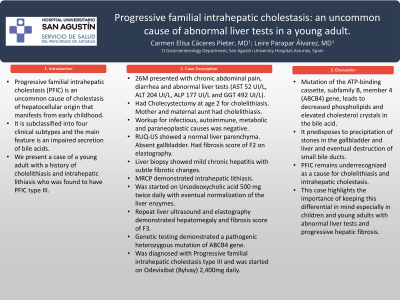Sunday Poster Session
Category: Biliary/Pancreas
P0190 - Progressive Familial Intrahepatic Cholestasis: An Uncommon Cause of Abnormal Liver Tests in a Young Adult
Sunday, October 27, 2024
3:30 PM - 7:00 PM ET
Location: Exhibit Hall E

Has Audio
- CC
Carmen Elisa Caceres Pieter, MD
Hospital Universitario San Agustín
Aviles, Asturias, Spain
Presenting Author(s)
Carmen Elisa Caceres Pieter, MD, Leire Parapar Álvarez, MD
Hospital Universitario San Agustín, Aviles, Asturias, Spain
Introduction: Progressive familial intrahepatic cholestasis (PFIC) is an uncommon cause of cholestasis of hepatocellular origin that manifests from early childhood. It is subclassified into four clinical subtypes and the main feature is an impaired secretion of bile acids. We present an interesting case of a young adult with a history of cholelithiasis and intrahepatic lithiasis who was found to have PFIC type III.
Case Description/Methods: We present a case of a 26 years old male who was referred to our Gastroenterology clinic for chronic abdominal pain, diarrhea and abnormal liver tests (AST 52 UI/L, ALT 204 UI/L, Alkaline Phosphatase 177 UI/L and GGT 492 UI/L). He has history of Class I Obesity and Cholecystectomy at age 2 for cholelithiasis. Family history is significant for mother and maternal aunt who had cholelithiasis. On presentation, the physical exam was unremarkable. Extensive workup for infectious, autoimmune, metabolic and paraneoplastic causes was negative. Right Upper Quadrant Ultrasound showed a normal liver parenchyma and absent gallbladder from prior cholecystectomy. Elastography was consistent with a fibrosis score of F2. He underwent a liver biopsy which showed mild chronic hepatitis with subtle fibrotic changes. MRCP demonstrated intrahepatic lithiasis. He was started on Ursodeoxycholic acid 500 mg twice daily with eventual normalization of the liver enzymes. Repeat liver ultrasound and elastography demonstrated hepatomegaly and fibrosis score of F3. Given the progression of his presentation and history of cholelithiasis at age 2 leading to cholecystectomy, suspicion for progressive familial intrahepatic cholestasis was raised. Genetic testing was performed after genetic counseling and demonstrated a pathogenic heterozygous mutation of ABCB4 gene. He was diagnosed with Progressive familial intrahepatic cholestasis type III and was started on Odevixibat (Bylvay) 2,400mg daily.
Discussion: Mutation of the ATP-binding cassette, subfamily B, member 4 (ABCB4) gene, leads to decreased phospholipid content with higher content of cholesterol crystals in the bile acid which precipitate as stones in the gallbladder and liver and eventual destruction of small bile ducts. PFIC remains underrecognized as a cause for cholelithiasis and intrahepatic cholestasis. This case highlights the importance of keeping this differential in mind especially in children and young adults with abnormal liver tests and progressive hepatic fibrosis.
Disclosures:
Carmen Elisa Caceres Pieter, MD, Leire Parapar Álvarez, MD. P0190 - Progressive Familial Intrahepatic Cholestasis: An Uncommon Cause of Abnormal Liver Tests in a Young Adult, ACG 2024 Annual Scientific Meeting Abstracts. Philadelphia, PA: American College of Gastroenterology.
Hospital Universitario San Agustín, Aviles, Asturias, Spain
Introduction: Progressive familial intrahepatic cholestasis (PFIC) is an uncommon cause of cholestasis of hepatocellular origin that manifests from early childhood. It is subclassified into four clinical subtypes and the main feature is an impaired secretion of bile acids. We present an interesting case of a young adult with a history of cholelithiasis and intrahepatic lithiasis who was found to have PFIC type III.
Case Description/Methods: We present a case of a 26 years old male who was referred to our Gastroenterology clinic for chronic abdominal pain, diarrhea and abnormal liver tests (AST 52 UI/L, ALT 204 UI/L, Alkaline Phosphatase 177 UI/L and GGT 492 UI/L). He has history of Class I Obesity and Cholecystectomy at age 2 for cholelithiasis. Family history is significant for mother and maternal aunt who had cholelithiasis. On presentation, the physical exam was unremarkable. Extensive workup for infectious, autoimmune, metabolic and paraneoplastic causes was negative. Right Upper Quadrant Ultrasound showed a normal liver parenchyma and absent gallbladder from prior cholecystectomy. Elastography was consistent with a fibrosis score of F2. He underwent a liver biopsy which showed mild chronic hepatitis with subtle fibrotic changes. MRCP demonstrated intrahepatic lithiasis. He was started on Ursodeoxycholic acid 500 mg twice daily with eventual normalization of the liver enzymes. Repeat liver ultrasound and elastography demonstrated hepatomegaly and fibrosis score of F3. Given the progression of his presentation and history of cholelithiasis at age 2 leading to cholecystectomy, suspicion for progressive familial intrahepatic cholestasis was raised. Genetic testing was performed after genetic counseling and demonstrated a pathogenic heterozygous mutation of ABCB4 gene. He was diagnosed with Progressive familial intrahepatic cholestasis type III and was started on Odevixibat (Bylvay) 2,400mg daily.
Discussion: Mutation of the ATP-binding cassette, subfamily B, member 4 (ABCB4) gene, leads to decreased phospholipid content with higher content of cholesterol crystals in the bile acid which precipitate as stones in the gallbladder and liver and eventual destruction of small bile ducts. PFIC remains underrecognized as a cause for cholelithiasis and intrahepatic cholestasis. This case highlights the importance of keeping this differential in mind especially in children and young adults with abnormal liver tests and progressive hepatic fibrosis.
Disclosures:
Carmen Elisa Caceres Pieter indicated no relevant financial relationships.
Leire Parapar Álvarez indicated no relevant financial relationships.
Carmen Elisa Caceres Pieter, MD, Leire Parapar Álvarez, MD. P0190 - Progressive Familial Intrahepatic Cholestasis: An Uncommon Cause of Abnormal Liver Tests in a Young Adult, ACG 2024 Annual Scientific Meeting Abstracts. Philadelphia, PA: American College of Gastroenterology.
